Employee Motivation: Exploring Factors, Impacts, and Coping Strategies
VerifiedAdded on 2023/06/14
|7
|1782
|242
Report
AI Summary
This report delves into the multifaceted concept of employee motivation, highlighting its significance in achieving organizational goals. It discusses various factors that drive employees, including salary, promotion opportunities, and work environment, while also examining Maslow's hierarchy of needs and the concepts of intrinsic and extrinsic motivation. The report further analyzes the positive and negative factors employees experience in their job roles, such as a supportive work environment and excessive workloads, respectively. Finally, it proposes strategies for mitigating negative factors, emphasizing the importance of effective decision-making and providing employees with opportunities to express their opinions. The report concludes that a motivated workforce is crucial for improved performance and overall organizational success.
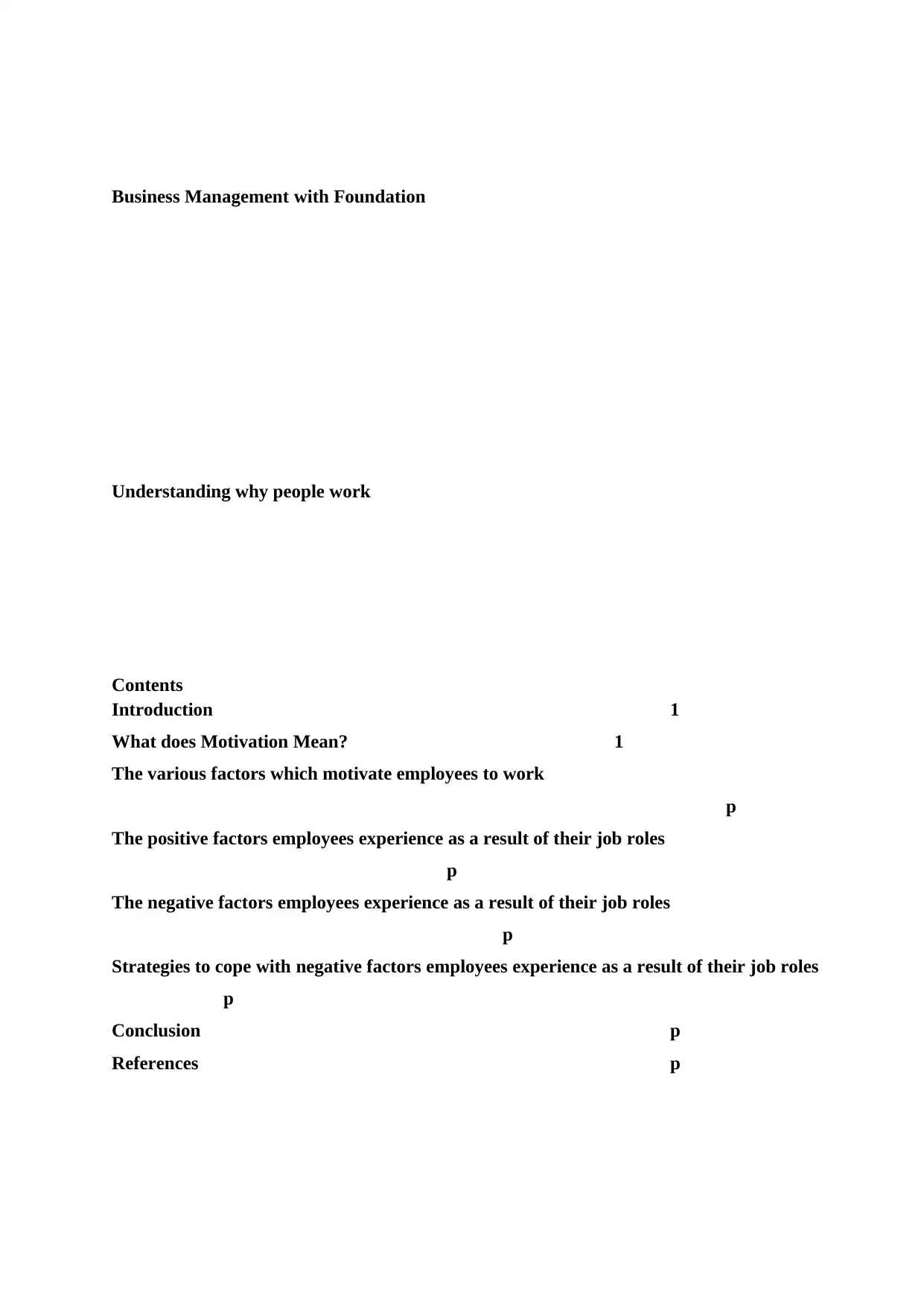
Business Management with Foundation
Understanding why people work
Contents
Introduction 1
What does Motivation Mean? 1
The various factors which motivate employees to work
p
The positive factors employees experience as a result of their job roles
p
The negative factors employees experience as a result of their job roles
p
Strategies to cope with negative factors employees experience as a result of their job roles
p
Conclusion p
References p
Understanding why people work
Contents
Introduction 1
What does Motivation Mean? 1
The various factors which motivate employees to work
p
The positive factors employees experience as a result of their job roles
p
The negative factors employees experience as a result of their job roles
p
Strategies to cope with negative factors employees experience as a result of their job roles
p
Conclusion p
References p
Paraphrase This Document
Need a fresh take? Get an instant paraphrase of this document with our AI Paraphraser

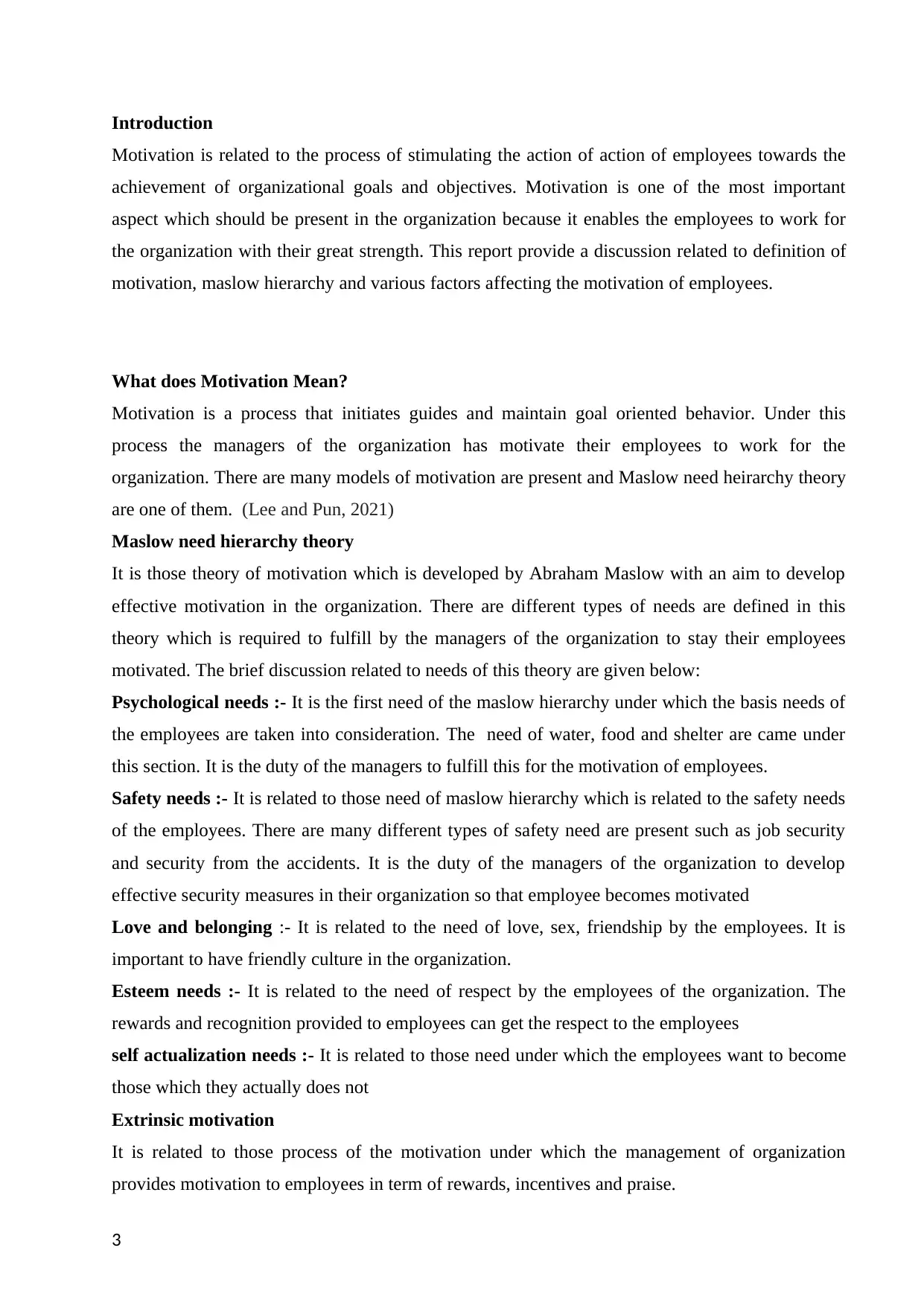
Introduction
Motivation is related to the process of stimulating the action of action of employees towards the
achievement of organizational goals and objectives. Motivation is one of the most important
aspect which should be present in the organization because it enables the employees to work for
the organization with their great strength. This report provide a discussion related to definition of
motivation, maslow hierarchy and various factors affecting the motivation of employees.
What does Motivation Mean?
Motivation is a process that initiates guides and maintain goal oriented behavior. Under this
process the managers of the organization has motivate their employees to work for the
organization. There are many models of motivation are present and Maslow need heirarchy theory
are one of them. (Lee and Pun, 2021)
Maslow need hierarchy theory
It is those theory of motivation which is developed by Abraham Maslow with an aim to develop
effective motivation in the organization. There are different types of needs are defined in this
theory which is required to fulfill by the managers of the organization to stay their employees
motivated. The brief discussion related to needs of this theory are given below:
Psychological needs :- It is the first need of the maslow hierarchy under which the basis needs of
the employees are taken into consideration. The need of water, food and shelter are came under
this section. It is the duty of the managers to fulfill this for the motivation of employees.
Safety needs :- It is related to those need of maslow hierarchy which is related to the safety needs
of the employees. There are many different types of safety need are present such as job security
and security from the accidents. It is the duty of the managers of the organization to develop
effective security measures in their organization so that employee becomes motivated
Love and belonging :- It is related to the need of love, sex, friendship by the employees. It is
important to have friendly culture in the organization.
Esteem needs :- It is related to the need of respect by the employees of the organization. The
rewards and recognition provided to employees can get the respect to the employees
self actualization needs :- It is related to those need under which the employees want to become
those which they actually does not
Extrinsic motivation
It is related to those process of the motivation under which the management of organization
provides motivation to employees in term of rewards, incentives and praise.
3
Motivation is related to the process of stimulating the action of action of employees towards the
achievement of organizational goals and objectives. Motivation is one of the most important
aspect which should be present in the organization because it enables the employees to work for
the organization with their great strength. This report provide a discussion related to definition of
motivation, maslow hierarchy and various factors affecting the motivation of employees.
What does Motivation Mean?
Motivation is a process that initiates guides and maintain goal oriented behavior. Under this
process the managers of the organization has motivate their employees to work for the
organization. There are many models of motivation are present and Maslow need heirarchy theory
are one of them. (Lee and Pun, 2021)
Maslow need hierarchy theory
It is those theory of motivation which is developed by Abraham Maslow with an aim to develop
effective motivation in the organization. There are different types of needs are defined in this
theory which is required to fulfill by the managers of the organization to stay their employees
motivated. The brief discussion related to needs of this theory are given below:
Psychological needs :- It is the first need of the maslow hierarchy under which the basis needs of
the employees are taken into consideration. The need of water, food and shelter are came under
this section. It is the duty of the managers to fulfill this for the motivation of employees.
Safety needs :- It is related to those need of maslow hierarchy which is related to the safety needs
of the employees. There are many different types of safety need are present such as job security
and security from the accidents. It is the duty of the managers of the organization to develop
effective security measures in their organization so that employee becomes motivated
Love and belonging :- It is related to the need of love, sex, friendship by the employees. It is
important to have friendly culture in the organization.
Esteem needs :- It is related to the need of respect by the employees of the organization. The
rewards and recognition provided to employees can get the respect to the employees
self actualization needs :- It is related to those need under which the employees want to become
those which they actually does not
Extrinsic motivation
It is related to those process of the motivation under which the management of organization
provides motivation to employees in term of rewards, incentives and praise.
3
⊘ This is a preview!⊘
Do you want full access?
Subscribe today to unlock all pages.

Trusted by 1+ million students worldwide
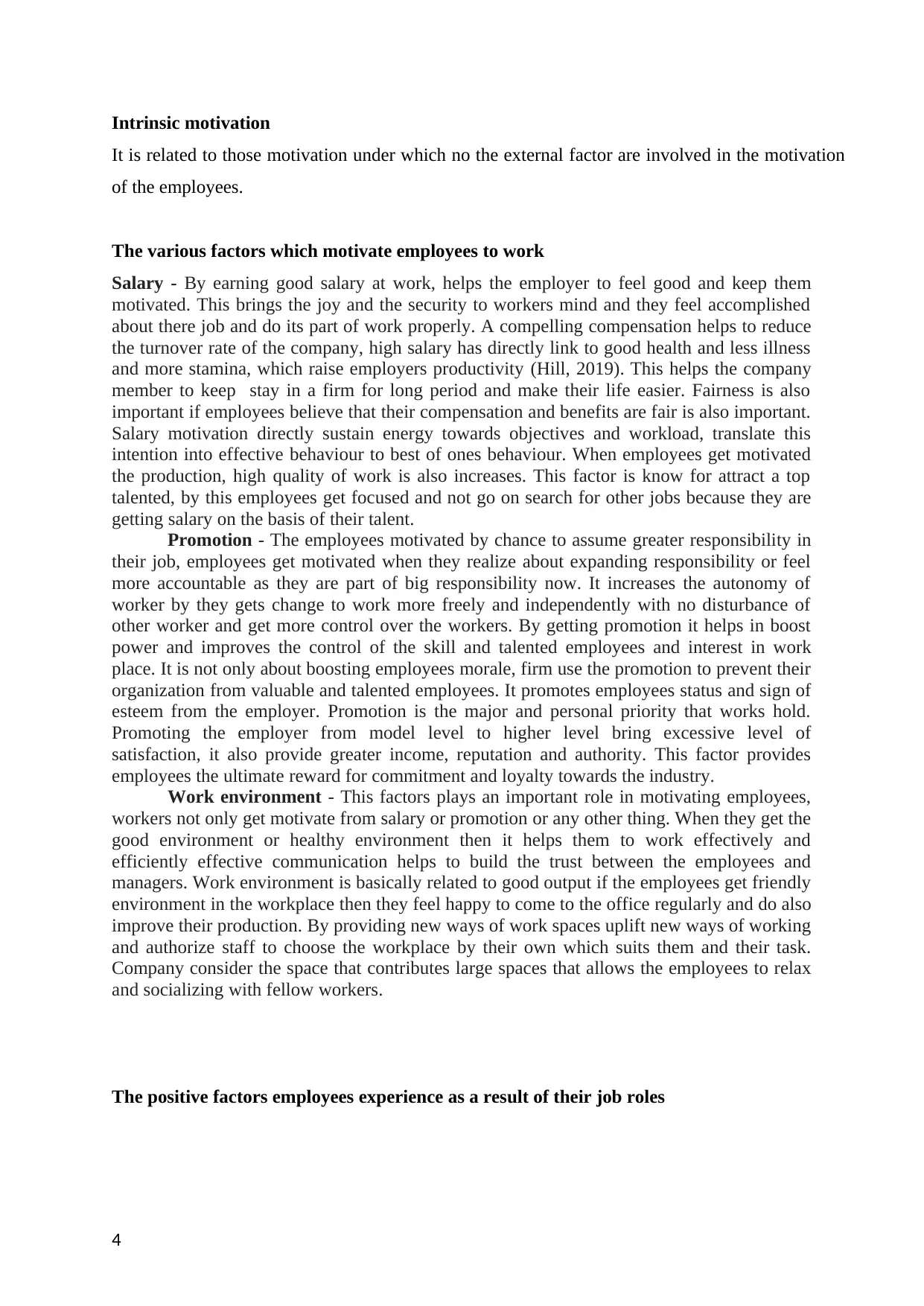
Intrinsic motivation
It is related to those motivation under which no the external factor are involved in the motivation
of the employees.
The various factors which motivate employees to work
Salary - By earning good salary at work, helps the employer to feel good and keep them
motivated. This brings the joy and the security to workers mind and they feel accomplished
about there job and do its part of work properly. A compelling compensation helps to reduce
the turnover rate of the company, high salary has directly link to good health and less illness
and more stamina, which raise employers productivity (Hill, 2019). This helps the company
member to keep stay in a firm for long period and make their life easier. Fairness is also
important if employees believe that their compensation and benefits are fair is also important.
Salary motivation directly sustain energy towards objectives and workload, translate this
intention into effective behaviour to best of ones behaviour. When employees get motivated
the production, high quality of work is also increases. This factor is know for attract a top
talented, by this employees get focused and not go on search for other jobs because they are
getting salary on the basis of their talent.
Promotion - The employees motivated by chance to assume greater responsibility in
their job, employees get motivated when they realize about expanding responsibility or feel
more accountable as they are part of big responsibility now. It increases the autonomy of
worker by they gets change to work more freely and independently with no disturbance of
other worker and get more control over the workers. By getting promotion it helps in boost
power and improves the control of the skill and talented employees and interest in work
place. It is not only about boosting employees morale, firm use the promotion to prevent their
organization from valuable and talented employees. It promotes employees status and sign of
esteem from the employer. Promotion is the major and personal priority that works hold.
Promoting the employer from model level to higher level bring excessive level of
satisfaction, it also provide greater income, reputation and authority. This factor provides
employees the ultimate reward for commitment and loyalty towards the industry.
Work environment - This factors plays an important role in motivating employees,
workers not only get motivate from salary or promotion or any other thing. When they get the
good environment or healthy environment then it helps them to work effectively and
efficiently effective communication helps to build the trust between the employees and
managers. Work environment is basically related to good output if the employees get friendly
environment in the workplace then they feel happy to come to the office regularly and do also
improve their production. By providing new ways of work spaces uplift new ways of working
and authorize staff to choose the workplace by their own which suits them and their task.
Company consider the space that contributes large spaces that allows the employees to relax
and socializing with fellow workers.
The positive factors employees experience as a result of their job roles
4
It is related to those motivation under which no the external factor are involved in the motivation
of the employees.
The various factors which motivate employees to work
Salary - By earning good salary at work, helps the employer to feel good and keep them
motivated. This brings the joy and the security to workers mind and they feel accomplished
about there job and do its part of work properly. A compelling compensation helps to reduce
the turnover rate of the company, high salary has directly link to good health and less illness
and more stamina, which raise employers productivity (Hill, 2019). This helps the company
member to keep stay in a firm for long period and make their life easier. Fairness is also
important if employees believe that their compensation and benefits are fair is also important.
Salary motivation directly sustain energy towards objectives and workload, translate this
intention into effective behaviour to best of ones behaviour. When employees get motivated
the production, high quality of work is also increases. This factor is know for attract a top
talented, by this employees get focused and not go on search for other jobs because they are
getting salary on the basis of their talent.
Promotion - The employees motivated by chance to assume greater responsibility in
their job, employees get motivated when they realize about expanding responsibility or feel
more accountable as they are part of big responsibility now. It increases the autonomy of
worker by they gets change to work more freely and independently with no disturbance of
other worker and get more control over the workers. By getting promotion it helps in boost
power and improves the control of the skill and talented employees and interest in work
place. It is not only about boosting employees morale, firm use the promotion to prevent their
organization from valuable and talented employees. It promotes employees status and sign of
esteem from the employer. Promotion is the major and personal priority that works hold.
Promoting the employer from model level to higher level bring excessive level of
satisfaction, it also provide greater income, reputation and authority. This factor provides
employees the ultimate reward for commitment and loyalty towards the industry.
Work environment - This factors plays an important role in motivating employees,
workers not only get motivate from salary or promotion or any other thing. When they get the
good environment or healthy environment then it helps them to work effectively and
efficiently effective communication helps to build the trust between the employees and
managers. Work environment is basically related to good output if the employees get friendly
environment in the workplace then they feel happy to come to the office regularly and do also
improve their production. By providing new ways of work spaces uplift new ways of working
and authorize staff to choose the workplace by their own which suits them and their task.
Company consider the space that contributes large spaces that allows the employees to relax
and socializing with fellow workers.
The positive factors employees experience as a result of their job roles
4
Paraphrase This Document
Need a fresh take? Get an instant paraphrase of this document with our AI Paraphraser
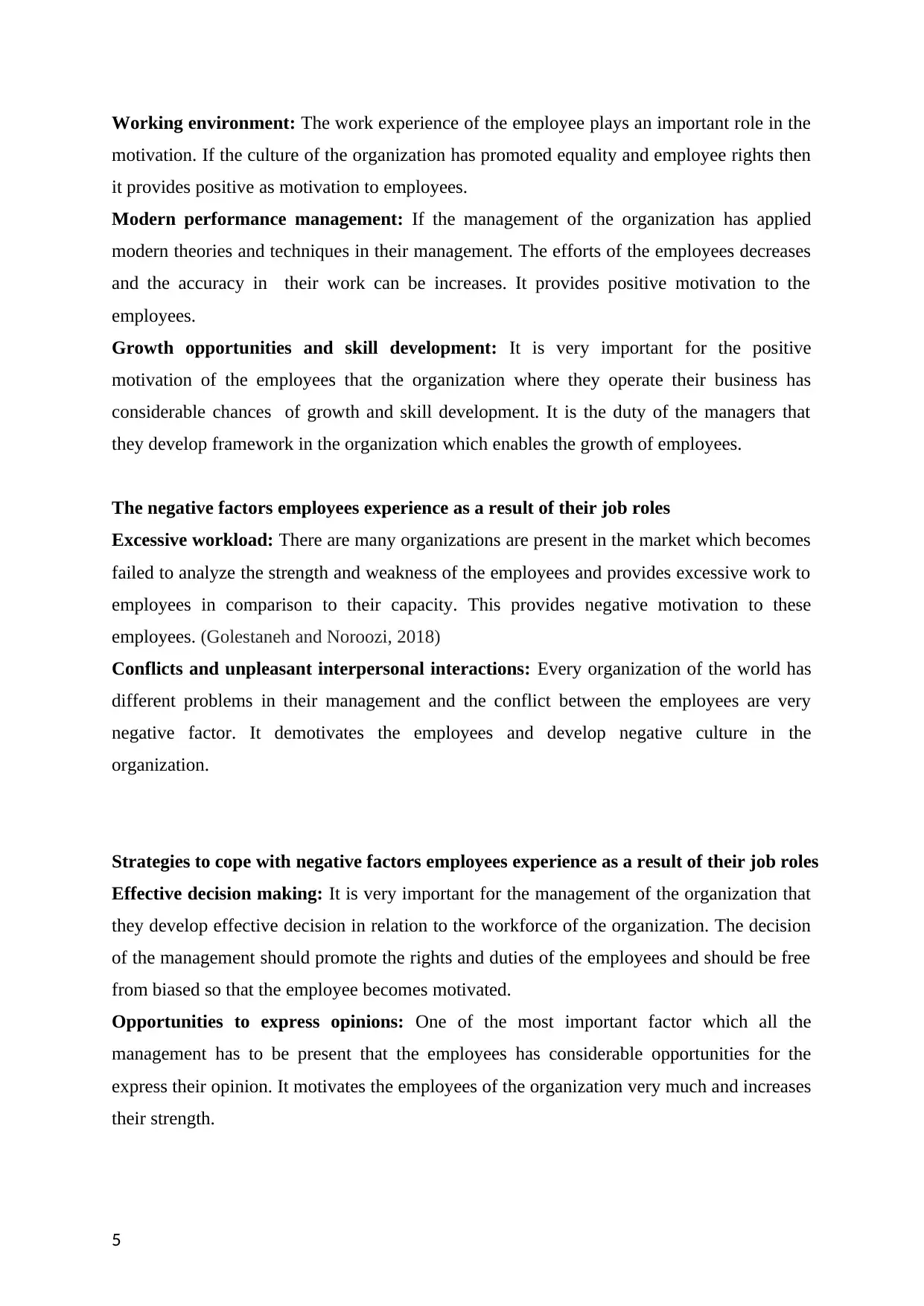
Working environment: The work experience of the employee plays an important role in the
motivation. If the culture of the organization has promoted equality and employee rights then
it provides positive as motivation to employees.
Modern performance management: If the management of the organization has applied
modern theories and techniques in their management. The efforts of the employees decreases
and the accuracy in their work can be increases. It provides positive motivation to the
employees.
Growth opportunities and skill development: It is very important for the positive
motivation of the employees that the organization where they operate their business has
considerable chances of growth and skill development. It is the duty of the managers that
they develop framework in the organization which enables the growth of employees.
The negative factors employees experience as a result of their job roles
Excessive workload: There are many organizations are present in the market which becomes
failed to analyze the strength and weakness of the employees and provides excessive work to
employees in comparison to their capacity. This provides negative motivation to these
employees. (Golestaneh and Noroozi, 2018)
Conflicts and unpleasant interpersonal interactions: Every organization of the world has
different problems in their management and the conflict between the employees are very
negative factor. It demotivates the employees and develop negative culture in the
organization.
Strategies to cope with negative factors employees experience as a result of their job roles
Effective decision making: It is very important for the management of the organization that
they develop effective decision in relation to the workforce of the organization. The decision
of the management should promote the rights and duties of the employees and should be free
from biased so that the employee becomes motivated.
Opportunities to express opinions: One of the most important factor which all the
management has to be present that the employees has considerable opportunities for the
express their opinion. It motivates the employees of the organization very much and increases
their strength.
5
motivation. If the culture of the organization has promoted equality and employee rights then
it provides positive as motivation to employees.
Modern performance management: If the management of the organization has applied
modern theories and techniques in their management. The efforts of the employees decreases
and the accuracy in their work can be increases. It provides positive motivation to the
employees.
Growth opportunities and skill development: It is very important for the positive
motivation of the employees that the organization where they operate their business has
considerable chances of growth and skill development. It is the duty of the managers that
they develop framework in the organization which enables the growth of employees.
The negative factors employees experience as a result of their job roles
Excessive workload: There are many organizations are present in the market which becomes
failed to analyze the strength and weakness of the employees and provides excessive work to
employees in comparison to their capacity. This provides negative motivation to these
employees. (Golestaneh and Noroozi, 2018)
Conflicts and unpleasant interpersonal interactions: Every organization of the world has
different problems in their management and the conflict between the employees are very
negative factor. It demotivates the employees and develop negative culture in the
organization.
Strategies to cope with negative factors employees experience as a result of their job roles
Effective decision making: It is very important for the management of the organization that
they develop effective decision in relation to the workforce of the organization. The decision
of the management should promote the rights and duties of the employees and should be free
from biased so that the employee becomes motivated.
Opportunities to express opinions: One of the most important factor which all the
management has to be present that the employees has considerable opportunities for the
express their opinion. It motivates the employees of the organization very much and increases
their strength.
5
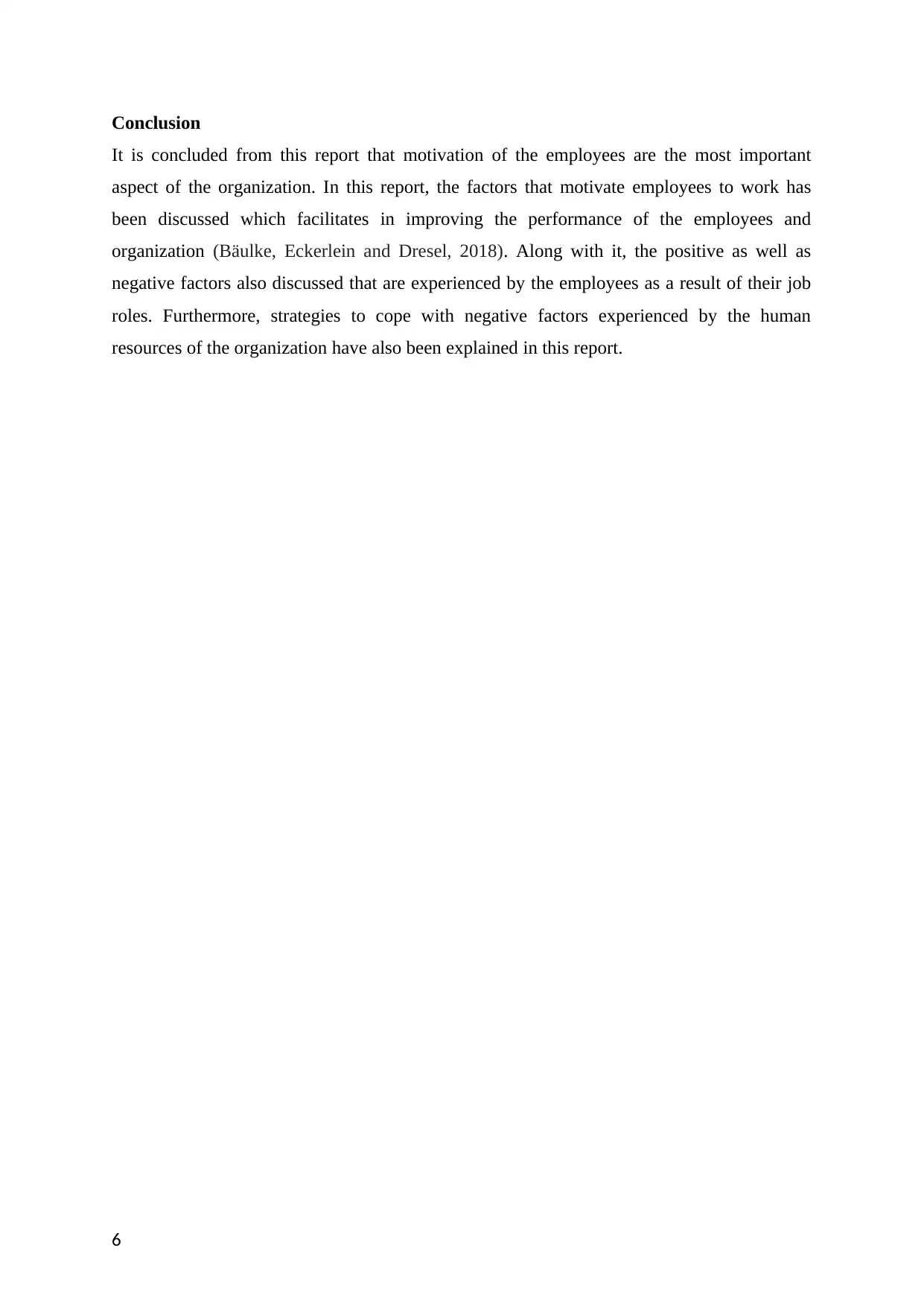
Conclusion
It is concluded from this report that motivation of the employees are the most important
aspect of the organization. In this report, the factors that motivate employees to work has
been discussed which facilitates in improving the performance of the employees and
organization (Bäulke, Eckerlein and Dresel, 2018). Along with it, the positive as well as
negative factors also discussed that are experienced by the employees as a result of their job
roles. Furthermore, strategies to cope with negative factors experienced by the human
resources of the organization have also been explained in this report.
6
It is concluded from this report that motivation of the employees are the most important
aspect of the organization. In this report, the factors that motivate employees to work has
been discussed which facilitates in improving the performance of the employees and
organization (Bäulke, Eckerlein and Dresel, 2018). Along with it, the positive as well as
negative factors also discussed that are experienced by the employees as a result of their job
roles. Furthermore, strategies to cope with negative factors experienced by the human
resources of the organization have also been explained in this report.
6
⊘ This is a preview!⊘
Do you want full access?
Subscribe today to unlock all pages.

Trusted by 1+ million students worldwide
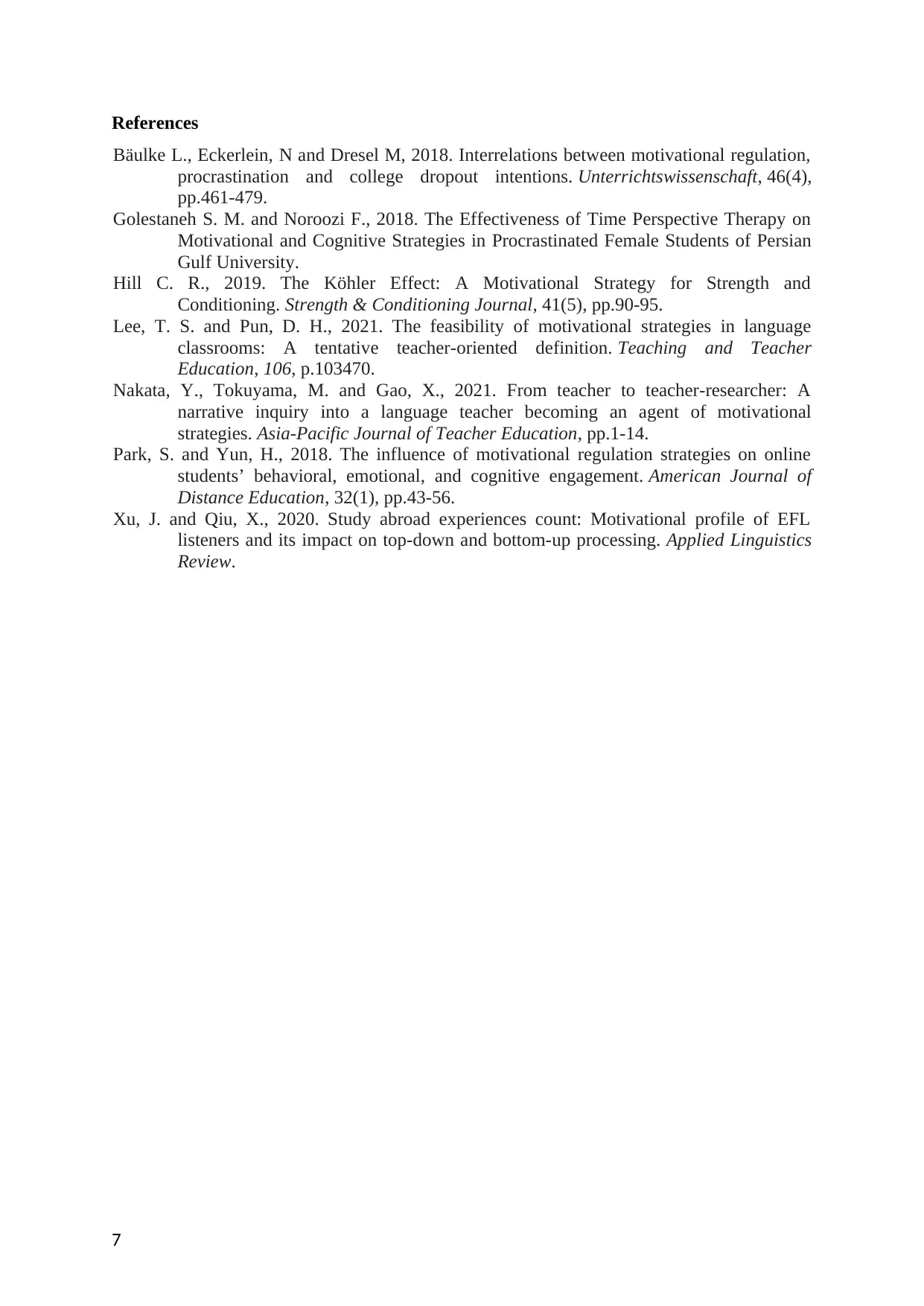
References
Bäulke L., Eckerlein, N and Dresel M, 2018. Interrelations between motivational regulation,
procrastination and college dropout intentions. Unterrichtswissenschaft, 46(4),
pp.461-479.
Golestaneh S. M. and Noroozi F., 2018. The Effectiveness of Time Perspective Therapy on
Motivational and Cognitive Strategies in Procrastinated Female Students of Persian
Gulf University.
Hill C. R., 2019. The Köhler Effect: A Motivational Strategy for Strength and
Conditioning. Strength & Conditioning Journal, 41(5), pp.90-95.
Lee, T. S. and Pun, D. H., 2021. The feasibility of motivational strategies in language
classrooms: A tentative teacher-oriented definition. Teaching and Teacher
Education, 106, p.103470.
Nakata, Y., Tokuyama, M. and Gao, X., 2021. From teacher to teacher-researcher: A
narrative inquiry into a language teacher becoming an agent of motivational
strategies. Asia-Pacific Journal of Teacher Education, pp.1-14.
Park, S. and Yun, H., 2018. The influence of motivational regulation strategies on online
students’ behavioral, emotional, and cognitive engagement. American Journal of
Distance Education, 32(1), pp.43-56.
Xu, J. and Qiu, X., 2020. Study abroad experiences count: Motivational profile of EFL
listeners and its impact on top-down and bottom-up processing. Applied Linguistics
Review.
7
Bäulke L., Eckerlein, N and Dresel M, 2018. Interrelations between motivational regulation,
procrastination and college dropout intentions. Unterrichtswissenschaft, 46(4),
pp.461-479.
Golestaneh S. M. and Noroozi F., 2018. The Effectiveness of Time Perspective Therapy on
Motivational and Cognitive Strategies in Procrastinated Female Students of Persian
Gulf University.
Hill C. R., 2019. The Köhler Effect: A Motivational Strategy for Strength and
Conditioning. Strength & Conditioning Journal, 41(5), pp.90-95.
Lee, T. S. and Pun, D. H., 2021. The feasibility of motivational strategies in language
classrooms: A tentative teacher-oriented definition. Teaching and Teacher
Education, 106, p.103470.
Nakata, Y., Tokuyama, M. and Gao, X., 2021. From teacher to teacher-researcher: A
narrative inquiry into a language teacher becoming an agent of motivational
strategies. Asia-Pacific Journal of Teacher Education, pp.1-14.
Park, S. and Yun, H., 2018. The influence of motivational regulation strategies on online
students’ behavioral, emotional, and cognitive engagement. American Journal of
Distance Education, 32(1), pp.43-56.
Xu, J. and Qiu, X., 2020. Study abroad experiences count: Motivational profile of EFL
listeners and its impact on top-down and bottom-up processing. Applied Linguistics
Review.
7
1 out of 7
Related Documents
Your All-in-One AI-Powered Toolkit for Academic Success.
+13062052269
info@desklib.com
Available 24*7 on WhatsApp / Email
![[object Object]](/_next/static/media/star-bottom.7253800d.svg)
Unlock your academic potential
Copyright © 2020–2025 A2Z Services. All Rights Reserved. Developed and managed by ZUCOL.



